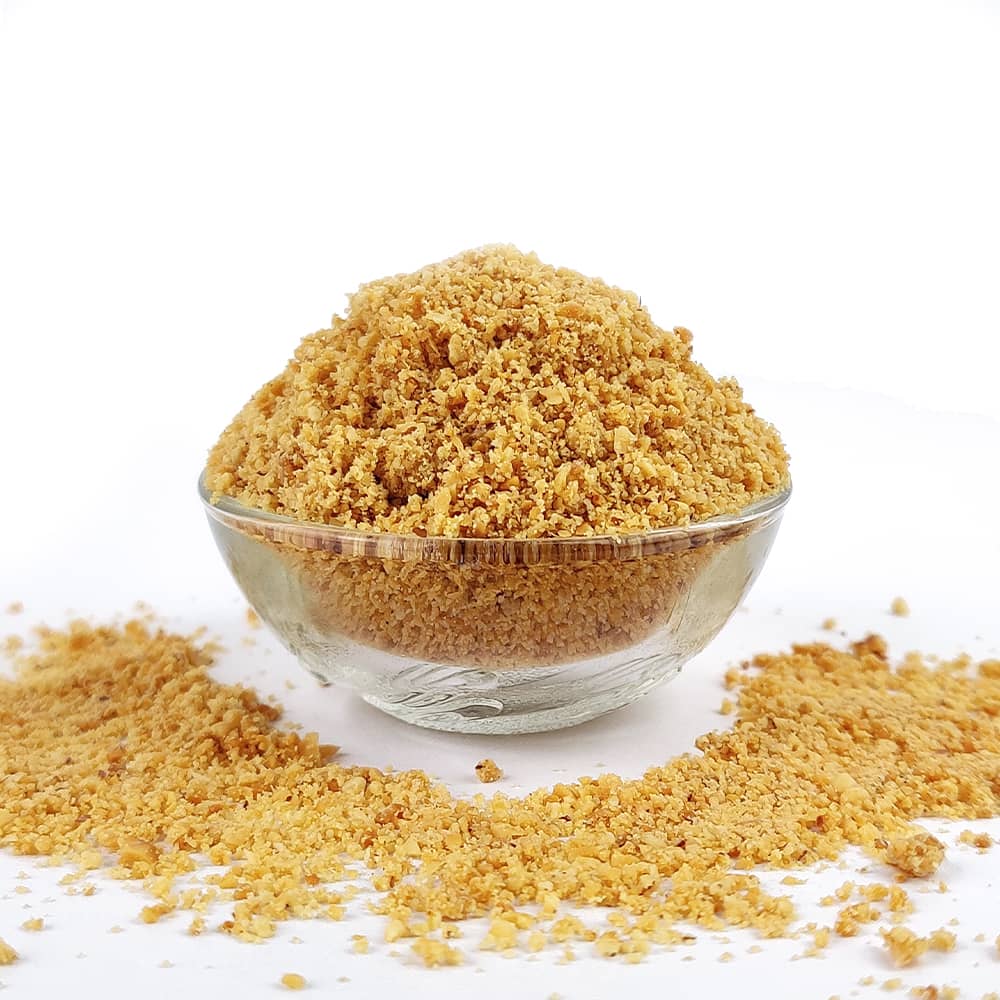Good Food Bar
Premium Peanut Powder
Premium Peanut Powder
Regular price
Rs. 109.00
Regular price
Rs. 1,199.00
Sale price
Rs. 109.00
Unit price
per
Couldn't load pickup availability
Peanut powder, also known as peanut flour or ground peanut, is made by grinding roasted peanuts into a fine powder. This versatile ingredient is popular for its rich peanut flavor and various culinary applications. Here are some key aspects of peanut powder:
### **1. ** **Ingredients:**
- **Peanuts:** The main and often the only ingredient in peanut powder is peanuts. Some varieties might contain added salt or sugar, depending on the intended use.
### **2. ** **Production:**
- **Roasting:** Peanuts are typically roasted before grinding. Roasting enhances their natural flavors and aromas.
- **Grinding:** The roasted peanuts are ground into a fine powder using industrial grinders. The process might vary, resulting in different textures, from coarse to very fine powders.
### **3. ** **Nutritional Value:**
- **Protein:** Peanut powder is high in protein, making it a popular choice among fitness enthusiasts and individuals looking for plant-based protein sources.
- **Fiber:** It contains dietary fiber, aiding in digestion and providing a feeling of fullness.
- **Healthy Fats:** Peanuts are a good source of unsaturated fats, which are heart-healthy.
- **Vitamins and Minerals:** Peanut powder contains essential nutrients like vitamin E, magnesium, phosphorus, and potassium.
### **4. ** **Uses:**
- **Smoothies:** Peanut powder is often added to smoothies for a nutty flavor and protein boost.
- **Baking:** It's used in baking to add peanut flavor to cookies, cakes, and muffins.
- **Cooking:** Chefs use it in sauces, soups, and stews to thicken and add a nutty taste.
- **Dusting:** Peanut powder can be sprinkled on desserts, oatmeal, or yogurt for flavor.
- **Gluten-Free Diets:** It's a popular ingredient in gluten-free and low-carb recipes.
### **5. ** **Allergies and Considerations:**
- **Allergies:** People with peanut allergies should avoid peanut powder as it can cause severe allergic reactions.
- **Caloric Content:** While it's lower in calories than traditional peanut butter, it's still calorie-dense and should be consumed in moderation.
### **6. ** **Storage:**
- **Airtight Containers:** Peanut powder should be stored in airtight containers to prevent it from going rancid.
- **Cool, Dark Place:** It's best kept in a cool, dark place, or even in the refrigerator, to prolong its freshness.
### **1. ** **Ingredients:**
- **Peanuts:** The main and often the only ingredient in peanut powder is peanuts. Some varieties might contain added salt or sugar, depending on the intended use.
### **2. ** **Production:**
- **Roasting:** Peanuts are typically roasted before grinding. Roasting enhances their natural flavors and aromas.
- **Grinding:** The roasted peanuts are ground into a fine powder using industrial grinders. The process might vary, resulting in different textures, from coarse to very fine powders.
### **3. ** **Nutritional Value:**
- **Protein:** Peanut powder is high in protein, making it a popular choice among fitness enthusiasts and individuals looking for plant-based protein sources.
- **Fiber:** It contains dietary fiber, aiding in digestion and providing a feeling of fullness.
- **Healthy Fats:** Peanuts are a good source of unsaturated fats, which are heart-healthy.
- **Vitamins and Minerals:** Peanut powder contains essential nutrients like vitamin E, magnesium, phosphorus, and potassium.
### **4. ** **Uses:**
- **Smoothies:** Peanut powder is often added to smoothies for a nutty flavor and protein boost.
- **Baking:** It's used in baking to add peanut flavor to cookies, cakes, and muffins.
- **Cooking:** Chefs use it in sauces, soups, and stews to thicken and add a nutty taste.
- **Dusting:** Peanut powder can be sprinkled on desserts, oatmeal, or yogurt for flavor.
- **Gluten-Free Diets:** It's a popular ingredient in gluten-free and low-carb recipes.
### **5. ** **Allergies and Considerations:**
- **Allergies:** People with peanut allergies should avoid peanut powder as it can cause severe allergic reactions.
- **Caloric Content:** While it's lower in calories than traditional peanut butter, it's still calorie-dense and should be consumed in moderation.
### **6. ** **Storage:**
- **Airtight Containers:** Peanut powder should be stored in airtight containers to prevent it from going rancid.
- **Cool, Dark Place:** It's best kept in a cool, dark place, or even in the refrigerator, to prolong its freshness.



